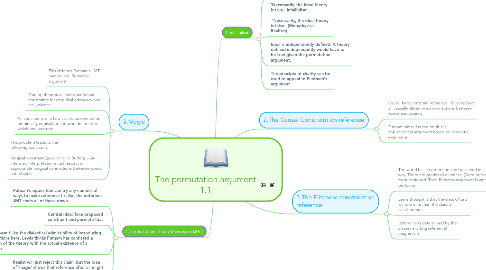The permutation argument 1.1
by Anna Bromely

1. 4.The Just More Theory Manoeuvre (JMT)
1.1. Putnam's opposition can try any number of ways to make reference fix. But the notorious JMT shuts all of these down.
1.2. Central idea: Take proposed constraint and permute that
1.3. Lewis doesn't like the dialectical admissibility of introducing permutations here. Lewis thinks Putnam has conflated a condition of the theory with the actual existence of a condition.
1.4. Realist will just reject this claim, but the idea of 'magic' shows that reference after all might be indeterminate.
2. 5.Magic
2.1. This defends Putnam's JMT manoeuvre. Putnam's argument
2.2. Trading theoretical and operational constraints for empirical adequacy and equivalence.
2.3. All constraints of a Lewisian nature would be empirically equivalent and wouldn't matter which one was true.
2.4. This problem leads to the following constraint. Magical constraint (according to Button) = An intended interpretation must respect all appropriate magical connections between words and objects.
3. 1.Infallibilism
3.1. An extension to the referential indeterminacy argument (permutations)
3.2. 'Necessarily, the ideal theory is true.' Infallibilsm 'Necessarily, the ideal theory is false.' (Metaphysical Realism)
3.3. Ideal is independently defined. A theory defined independently would have to be true given the permutation argument.
3.4. The principle of charity can be used to appeal to Puntnam's argument.
4. 2.The Causal Constraint on reference
4.1. Causal facts constrain reference . Must respect all causally determined connections between words and objects.
4.2. Putnam himself relied on this in anti-sceptical argument based on semantic externalism
5. 3.The Eliteness constraint on reference
5.1. The world has an order and can be carved in a particular sort of way. There are grades of eliteness. (Ontologese) If 2+2=4 is most profound. Then Putnams argument is among the least profound.
5.2. Lewis thought is that the class of cats is more elite than the class of cat-cherries
5.3. Reference is determined by the classes eliciting referential magnetism


